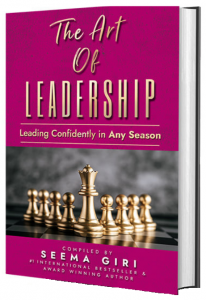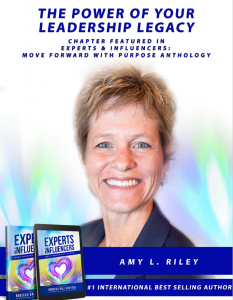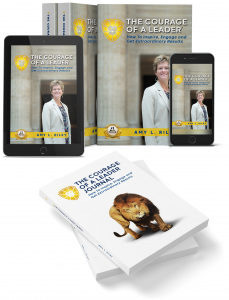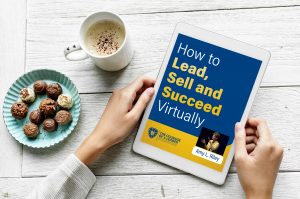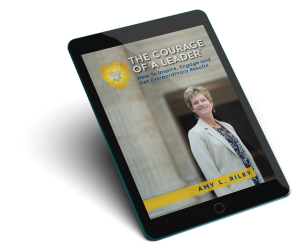Do you like to consider yourself a values-driven leader? Do you wonder how to assess how you’re doing?
My guest today on The Courage of a Leader podcast is Raj Echambadi. We delved into how he thinks about and practically demonstrates values that inspire and engage others.
Raj is the President of Illinois Institute of Technology and has a principle-driven vision for the institute and he shares with us how he thinks about and practically demonstrates values that inspire and engage others.
You’ll enjoy, be impressed and be inspired by what Raj has to say and how he says it.
This is not an episode to miss!
About the Guest:
Raj Echambadi became the 10th president of Illinois Institute of Technology in August 2021. Echambadi’s vision for Illinois Tech is centered on a new path to preeminence driven by four principles: first, honoring and strengthening the university’s role as an engine of opportunity and a national leader in economic mobility; second, pursuing growth through reimagining education to serve learners at all stages of life; third, fueling future innovation by empowering students; and fourth, exemplifying purpose-driven citizenship in service of the Bronzeville neighborhood, Chicago, and the world.
Previously, Echambadi served as the dean of D’Amore-McKim School of Business at Northeastern University. Before joining Northeastern, Echambadi served in various roles, including as senior associate dean of strategic innovation, at Gies College of Business at the University of Illinois at Urbana-Champaign, where he was a driving force behind a scaled online M.B.A. (iMBA) program that was lauded as one of the best educational innovations in the past decade.
Echambadi received his bachelor’s degree in mechanical engineering from Anna University in India and a doctorate in marketing from the University of Houston. His academic research focuses on strategic innovation within organizations and how firms should balance current and future opportunities. He has won numerous teaching and research accolades including the prestigious Academy of Management Journal Best Paper Award for his work on employee entrepreneurship.
About the Host:
Amy L. Riley is an internationally renowned speaker, author and consultant. She has over 2 decades of experience developing leaders at all levels. Her clients include Cisco Systems, Deloitte and Barclays.
As a trusted leadership coach and consultant, Amy has worked with hundreds of leaders one-on-one, and thousands more as part of a group, to fully step into their leadership, create amazing teams and achieve extraordinary results.
Amy’s most popular keynote speeches are:
- The Courage of a Leader: The Power of a Leadership Legacy
- The Courage of a Leader: Create a Competitive Advantage with Sustainable, Results-Producing Cross-System Collaboration
- The Courage of a Leader: Accelerate Trust with Your Team, Customers and Community
- The Courage of a Leader: How to Build a Happy and Successful Hybrid Team
Her new book is a #1 international best-seller and is entitled, The Courage of a Leader: How to Inspire, Engage and Get Extraordinary Results.
https://www.linkedin.com/in/amyshoopriley/
Link mentioned in the podcast
The Inspire Your Team assessment (the courage assessment): https://courageofaleader.com/inspireyourteam/
Thanks for listening!
Thanks so much for listening to The Courage of a Leader podcast! If you got inspired and/or got valuable leadership techniques you can use from this episode and think that others could benefit from listening, please share using the social media buttons on this page.
Do you have questions or feedback about this episode? Leave a comment in the section below!
Subscribe to the podcast
If you would like to get automatic updates of new The Courage of a Leader podcast episodes, you can subscribe to the podcast on Apple Podcasts. You can also subscribe in your favorite podcast app.
Leave us an Apple Podcasts review
Ratings and reviews from our listeners are extremely valuable to us and greatly appreciated. They help our podcast rank higher on Apple Podcasts, which helps us ignite The Courage of a Leader in more leaders! Please take a minute and leave an honest review on Apple Podcasts.
Teaser for next episode
Stay tuned for our next guest podcast episode – The Courageous Vision: Transform Any Organization to Higher Levels of Profit and Sustainability – with Will Busch III, an experienced strategy execution executive with a track record of helping organizations achieve profitable growth.
Transcript
Do you like to consider yourself a values driven leader? Do you wonder how to assess how you're doing as a values driven leader Raj Echambadi, the president of Illinois Institute of Technology I T, who has a principle driven vision for the Institute is my guest today on the podcast. And he shares with me how he thinks about and practically demonstrates values that inspire and engage others. You'll be impressed and you'll be inspired by what Raj has to say, and how he has to say it. I'm glad you're here to listen in.
Amy Riley:Welcome to the Courage of a Leader podcast. This is where you hear real life stories of top leaders achieving extraordinary results. And you'll get practical advice and techniques, you can immediately apply for your own success. This is where you will get inspired, and take bold, courageous action. I am so glad you can join us. I'm your host, Amy Riley. Now, are you ready to step into the full power of your leadership and achieve the results you care about most? Let's ignite the Courage of a Leader.
Amy Riley:Raj, thank you for being with me today on the Courage of a Leader podcast, we have decided to talk about how you as a leader live by your personal values day to day. And I'm super excited for you to share your story with listeners. Because as a leadership development practitioner, I explore values and how we demonstrate them and how they can pull us forward and have us operate in powerful and intentional ways. And there's always arrange a degree to which we readers go forward and live by their values day to day. So I'm excited for you to share your story and your intentionality with us. So Raj, why don't we start I know you have three top guiding principles that you intentionally live by, will you tell us what those are?
Raj Echambadi:Yeah, absolutely. Thank you, Amy, for this opportunity. And one of the amazing things about your podcast for me personally, was this morning, I had to retrospect, introspect, self examine. And, you know, hopefully, if lead to self improvement. So from a purely selfish point of view, I've already accomplished what I wanted to do out of this podcast. But on a serious note, thank you so much for this opportunity. To start off with a broad pointer about my purpose. I've had to think about this a lot over the last decade, I've always been in higher educational institutions, fundamentally, because higher education has afforded me incredible opportunities. The very fact that I'm here on this podcast with a special person like you, that has only been made possible, because of higher education. But when you praise my higher education, it is fundamentally due to the philanthropy of, you know, certain donors in Texas, and certain people in India that have made my journey possible. So when I think about my purpose, I feel like I have to be an opportunity in my institution has to be an opportunity and Gen. For people like me, so that they can go on to do great things for their communities, societies and the world at large. So that's my guiding purpose, if you will, yeah. And I'm very blessed to be in an industry that has accessibility and success as their guiding principles. So going back to Western about my values, there are three values that I try to live by intellectual humility and gratitude. My second value is question the status quo. And the third value is focused on the process, not on the outcome, which is fundamentally process oriented. So I'll take a minute to talk a little about each of them. So when we think about the first value, especially given the fact that I want our institution to be an opportunity engine, and my why is to enable those opportunities for people, it is extraordinarily important that I have intellectual humility. When I walk into a room, I want us I want to feel that we are all in this together, collectively, we are together are smarter than any one of us. Because that is when great things can happen. You know, when we go into rooms, especially, let's say I have an internal meeting, everybody knows, I lead this institution. And if I go around asking people to introduce people say, Vice President, Vice Provost Dean, and that hierarchy is an antithesis to humility, if you will. So what I tried to do is I asked people for a special story, tell me something special about you? Why don't you tell me how your mother would introduce you in a meeting. And it is amazing, Amy, people will say things like, Oh, I scaled Kilimanjaro, Mount Kilimanjaro four times in the last decade, or people will say I was a pianist for played at the Carnegie Hall and so on. So every one of us is special. Yes. So as somebody who provides an opportunity engine for people, it is important that I harness that special Ness, if you will, in people, and enable them to harness that potential so that they can be bigger than themselves. And when collectively all of us work together, great things can happen. So that is the first part of the intellectual humility. The second part of it is gratitude. Yeah, I think gratitude is one of those underappreciated attribute. Because what gratitude enables you to do is to, especially when you're running all organizations, when you are a president, or a CEO, or an exalted position in an organization, you are fundamentally running a talent studio. That's all it is. When people come to me and say, What should I do in the first 100 years of my presidency, I said, focus on your people. Because they will take care of the organization. And so to me, gratitude is fairly critical, because it is not just a cursory thanks, me for doing that, or whatever it is. But, but when you go inside and say to people, thank you, for all that you do. Thank you for being wonderful ambassadors, thank you for being wonderful evangelists, and so on. I think it does wonderful things for your organization. But more importantly, it does wonderful things to you, because there's a virtuous loop between gratitude and humility. So that's my first value. Raj,
Amy Riley:I'd love to underscore Gore, please, great things that you have said already. I mean, this intellectual humility, as you talk about it, I see how it sets up a belief and an intention, every time that you walk into a room or enter a conversation. We're all in this together, we all have something to contribute. Let's hear it. And I imagine that that's getting great diversity of thought. There is a concept that I share with leaders often that our beliefs, lead to behaviors lead to results. And the power when we come in with a belief like, we're all in this together, I'm gonna show up with intellectual humility. And then the actions we'll take is hearing from everybody, right and actually listening and being curious and curating that and that's going to lead to different kinds of results.
Unknown:And associated with this, Amy, is humility does one very interesting thing, which is, we are all in the idea business. I mean, at the end of the day, I tell people who work with me don't be vetoers of ideas, shape ideas. Shaping ideas can only happen if you are intellectually humble. And you say to yourself, I don't know have all the answers. There is a vulnerability concept also here, the great Brene Browns work on vulnerability because when people talk about either authenticity, your vulnerability, you need to tell people I don't have all the answers, but collectively, we can figure it out. Yes, it is my job to help you build even yourself, it is my job, not to destroy your confidence. Human beings are intrinsically confident if I walk into a room, because of my power, a word that I say, can hurt people. And it can actually have deleterious effects on their confidence. And so as a leader, I need to have the intellectual humility to understand everyone together, has the potential to accomplish some things great, but at the same time, understand the dark side of power, which is you can actually, in a moment, destroy a person's day, destroy a person's week, I had a direct report once, this was two days before Christmas. He wrote an email to his subordinate. And he sent that email out to me in my private institution for me to provide feedback. And I said, immediately called him, I said, Why are you sending this email? What is it you want to get out of it? He said, it's constructive feedback. I said, Do you have to send constructive feedback on the 22nd of December? What if that person wants to talk to you? When are you going to meet this person? He said, Well, the first week of January. So I said, you're going to let somebody steal for 10 days. And you're going to spoil their Christmas and be the Grinch. By this email. I said, Is there anything that you know, you can do by your work? Can this thing wait? Of course, it could wait. And then later on, you know what the funny thing was, this person didn't even have to send that email. I had a one on one coffee in January, found out they were coming in from different vantage points. And that's all it is. And so intellectual humility, also prevents you from assuming certain things. So the concept of intellectual humility coupled with gratitude, I think is a deep concept.
Amy Riley:Yeah, it's an it's an important pairing. You're reminding us all as leaders to be conscious of the impact that we have. We talk in one of the leadership programs that I'm a part of about how leaders are symbols, we're representing in every moment, whether we're conscious of it or not, right, it's not just like, okay, Tuesdays and Thursdays are the days that I pay attention to people who are constantly looking to you. Yes,
Raj Echambadi:that is exactly right. And one of the amazing concepts, when you think about intellectual humility, is understanding the concept that work, you know, can fit in the size of a bar. What you don't know is the size of an ocean. It's an old Tom was saying, by the way. And that's all we need to understand if you understand that, that work, you know, can fit this palm, you know, that's it.
Amy Riley:Yeah, I think that's a great reminder, I see many leaders, they get promoted, because they know a lot, and they're an expert in their area. And you get to thinking that my job as a leader is to share that knowledge and that expertise, and to always be talking and sharing out rather than listening and learning. Yeah,
Raj Echambadi:you and I both have your high connections. And so I want to tell you something that Joe is the former president of the University of Illinois told me, okay, I asked him for some advice on how to be a good leader. He said, make sure that the ratio of listening to speaking is appropriate. And I said, What does that mean? He said, You should always walk out of a meeting with the other person having spoken more, and you having listened more. And I have two daughters. And my younger daughter always tells me when I'm out to go for a major speech or something she knows because in the morning, I'm usually huddled over prepping to come in and say that just one piece of advice, don't pontificate. And I always remember that. I always remember that because I thought, Wow, that's a profound piece of wisdom. You know, because when you think you know, when you think is the operative word, you know, much. There is an urge to share, because I want to say okay, here is all the wisdom that I've gained. And that's a dangerous thing to to live by. Brilliant
Amy Riley:guidance from your daughter. Yes, yes. Yeah, Raj. I haven't even let you get to talking about your second guiding pill. I
Raj Echambadi:say this as questioning conventional wisdom. A lot of times I think as leader As I think our greatest strength is, I told you harnessing the potential of people. But the way to do it is the question so that people get their critical thinking skills up. And they actually can learn, you know, questioning conventional wisdom westdene status quo. Don't accept the ways of the world as gospel. Because if you are a leader, and you are about change, and if you want that change to be transformative and not incremental, it is important that you start listening. I'll give you a very quick example, when I was at the University of Illinois, we decided to launch an online MBA Program, or $60,000.02 year program, because our pace to our residential program that my team person charged that, okay, and that was in conversations with Coursera, then, and the density of Coursera, Daphne color was on the call with me. And we still call it the call, because the meeting, which was supposed to be for an hour ended in three minutes. I started by saying, I have this MBA program idea. And she said, What is it you want to do? I said, I want to port the face to face program to online and charge $60,000. Yeah. She said, Why 60,000? I said, Well, that's what we charge in our face to face program. She said, Okay, you're doing online, is there a different pricing structure or online? Because you're going to enable scale? I said, Well, I don't know. And she said, Why don't you think about this with your team and get back to me. So meeting was over in three minutes. And we went back and thought about it. And the result was, in my humble opinion, the most disruptive, disruptive program graduate American education had ever seen. So that program we launched at $18,000 for two years, one, eight. Okay. $18,000. And today 10% of all online MBA program, degrees that are awarded in the United States, they go to the University of Illinois, that happened because of Daphne Kolors. Weston, why? Because it was assumed to be gospel. So that is what I tell people that they need to live by Western, it is not to be argumentative, but Wessling enables you to probe deeply into the inner workings and the facets. And when you want transformative change, when you want change that lasts, you need to go deep. And that's basically what that second value is all about.
Amy Riley:te of Technology in August of:Raj Echambadi:Thank you. I need the honor this mine I will say one thing though, all of these accomplishments and achievements were made possible because of a lot of people a team of people in every case so when people associate me as the architect today MBA excetera I was basically the leader of that team, but it is the team that actually executed the the hard work, if you will. So I'm very blessed in that sense as well, in order to empower the wonderful teams along my leadership journey that has taught me a lot, but also helped us accomplish great things together. Your
Amy Riley:intellectual humility and gratitude are showing right there. So tell us about focus on the process. Yeah.
Raj Echambadi:So this actually comes from one of the holy books in those Bhagavad Gita. So Arjuna, the warrior Prince is standing in the battlefield facing his cousins, and it's very perturbed, that he has to go into war with this old cousin sort of drops his bow, and the Lord Krishna basically talks to them, gives them the courage to go through with the war. But the most important line in the Bhagavad Gita to me was focus on the process, not on the outcome, you will need to have a detached attachment, if you will, to the outcome. And I never understood this me when I was growing up. This is something that people said to me all the time. But what I have understood now, or This to me is as follows. Do the little things well, these little things add up to big things, but focus on proud the process of doing things well. And don't worry about the outcome. Let's say you are a tennis player. Don't focus on winning the match, because that puts undue pressure. Focus on doing the things well, you have practice your serves your practice your Balis, your practice everything before, execute them, well do the things that you've always done well, and go point by point by point clear the process well, and an outcome is, you know, is what is going to follow it love an anecdote by Tom Brady that I read recently, when Tom Brady was a third string quarterback at the University of Michigan, he was very upset that he got only two reps as opposed to the starting quarterback who got 20 reps. And so you went to his coach and and I said, What is this, I only get two reps and the other person gets 20 reps. And the coach said to him, parently, don't focus on the other person's to add reps, focus on doing your two reps well, and Tom Brady says he had a mind shift. So after that, every rep that he did, he walked in with enthusiasm. And he acted like AI as if it was a rep at a Super Bowl, and so on. And that enthusiasm was visible to other people, his teammates and so on. He made them better and two reps became four and four became a need became 20, and so on. So so to me, that is what this process means to me. Because sometimes, you may get an outcome that was not process driven. You know, it's like every once in a while even a blind squirrel points are not right, you have to be extraordinarily careful that you're not fixated on the outcome, the outcome without the right process is a disaster in the long run. But on the other hand, if you focus on the process and do the process, well, the outcome is almost always guaranteed and sustainable. And that's my philosophy as far as the process focus, as opposed to be outcome focus.
Amy Riley:I like it, Raj, this is bringing up the concept of goal setting to me. And of course, we can have outcome goals and we can have process goals or practices, right intentions, whatever language we want to use. Now, often we've been told, hey, put that big outcome goal out there. That's going to be inspiring, that's really going to get people going and up in in the morning. How do we motivate folks to focus on the process? Yeah, right and getting it getting the details right, day to day? Yes.
Raj Echambadi:Before we go there, two or three weeks ago, I was at a keynote speech made by Admiral McRaven and it was probably one of the most inspiring talks that I've ever heard. And one of the things he says, as you probably know, is this famous thing, do your bed well in the morning. And he was talking about his days in Afghanistan where he was living in an eight by eight square that was bolstered by plywood. And he will leave that room in the morning at eight o'clock. Probably not show up for 20 hours for the four hours. And here to do a variety of things, but when he came back, he said, The bed was always made. And it was a Shangri La, right. And so process to me, is like the Shangri La for all of us. And so that's why I say, Pastor, this is not to say me that outcomes are not important. This is not to say moonshots are not important. But as a leader, this is let's say we have a 20% market share. And we say well, we want to make it 40% Next year, that's okay. But because that helps inspire that is audacious sometimes it's a moonshot, people like to be a part of transformation transformation. But where I want to focus on is, those goals are okay. But ensure that your people have the right kind of process to get to those goals. And if they don't make them make the goals, despite having prior followed the best process, you need to be able to live with as a leader. And that is the culture shaping that you must do. You know, when when people talk about failures, I always distinguish between failures and mistakes, mistakes happen, because of lack of planning. failures happen, despite the best planning, okay, and so so let's say we say 40%, market share is the goal, and you end up at 33%. But the process was great. That's okay. And that's a learning experience for us. That is why I say to people, the goals are okay. But evaluate your team on the process. Because over time, as they get better and better and better with a process, then you're going to build a culture of high performance. So it's actually counterintuitive. By not being focused on the outcome, you become better on the outcomes. Yeah.
Amy Riley:I mean, that's really the crux of it. When you said, evaluate your team on the process, right? We don't want to get to the goal. In no matter what way. We don't want to cut corners in order to say, like, did these deals and we got the 40% market share. If we have superb process, and we get to 33%? Well, then we've built practices, this stones, scenes, that might then eventually get us to the 40%. But we're gonna be set up with more sustainable. Yes,
Raj Echambadi:that's exactly correct. It's how I view it. And the thing that Lord Krishna says, In the Bhagavad Gita is you must act, inaction is not an option, you must stack. But focus on the process. If you focus on the process, and you know, you have to act, outcomes will happen. So that's to round out the entire code. Because I don't want Hindus emailing you and say any this guy was incomplete. Okay.
Amy Riley:Thank you. Thank you. Our time has gone by quickly today. I want to ask this question before we wrap Raj. So, sometimes leaders connect with their values in moments right and then they fade in other moments, how do you in a very practical way keep your values front and center? Obviously, the more time we practice and live by them, they become more automatic and more present for us? How do you make sure that there there there.
Raj Echambadi:So the first thing is I have a journal and when you open the first page of the journal, these are the values I have written, you know. So every morning when I prepare my to do list etc, there is a visual reminder that I get to see about my values. Second is you have to have people around you that speak Truth to Power in a in an organization or that speak the truth. When I when my daughter said to me don't pontificate that was the version of our truth for me. I have some amazing people in my organization, who privately will come to me and say, This is not okay. Here are the reasons why and so on. Unless otherwise, you have the intellectual humility to say, Okay, you are right. You know, you're not going to take that piece of advice. But if you don't take it and you dismiss them off, you're not living your values anyway. So it is extraordinarily important that you have the right kind of people around you, perhaps I have, I have an executive coach, who I talked with, and helped me. And last, but not the least, is, I would say, every night, when I go home, when I'm driving back, a replay that the I see what went well, what didn't go well, the days that I'm disappointed, or when I've not lived my values. And then I say, Okay, tomorrow onwards, I'm going to fix it. So it's a continuous improvement, you're never going to ever get to the destination of perfection. But you work and and follow that trajectory. So you've become a better version of yourself every day.
Amy Riley:Appreciate that, Raj. So I'm hearing for everyone out there, you've got the visual reminder, right? What are what are our visual reminders of our values, what's important to us what we want to emulate, you've told others ride share with others. So there's those around you that can help hold you accountable for that. You have support, be an executive coach, a mentor, a colleague, someone you can confide in and get the real story from. And I'm hearing this process of reflection, probably not going to win the game of playing perfection here. Right. But things unfold. What do we take from that? Right? How do we want to show up the next day? And hearing that there is a daily presencing? Yes, we really we're going to call I would love for all listeners to create their own version of what you just shared with us. Yes.
Raj Echambadi:One important thing is what you just said, Don't strive for perfection. Don't let perfect be the enemy of the very good. Our goal every day is to get better and better and better. But as long as we are on that journey, again, this has to be approached in a very humble manner, with a lot of gratitude to people around you. If you do that, I think good things are gonna happen to not only you, but to the organization that you lead,
Amy Riley:I think that is a great note to end on. Because it would be easy to think these are our values. This is what we've said is most important to us. We should live by that 100%. But life is complicated. Life is messy. Life is a learning journey. Right? And just keep keep playing the game. Keep showing up with your intentions
Raj Echambadi:right there.
Amy Riley:Thank you so much for sharing with us what is personally important to you. I appreciate you and your time.
Raj Echambadi:Thank you, Amy. Again, as I started this conversation, it's been a phenomenal process for me to introspect and examine myself and and on this quest to becoming a better me every day. I think you did an amazing job today pushing me up that curve a little bit faster today.
Amy Riley:Well, I always say it doesn't work if others don't do the work. This has been a pleasure to do this with you, Raj.
Raj Echambadi:I appreciate it.
Amy Riley:Thank you for listening to the Courage of a Leader podcast. If you'd like to further explore this episode's topic, please reach out to me through the Courage of a Leader website at www.courageofaleader.com. I'd love to hear from you. Please take the time to leave a review on iTunes. That helps us expand our reach and get more people fully stepping into their leadership potential. Until next time, be bold and be brave because you've got the Courage of a Leader.


 A Summary of The Courage of a Leader® 4 Pillars
A Summary of The Courage of a Leader® 4 Pillars